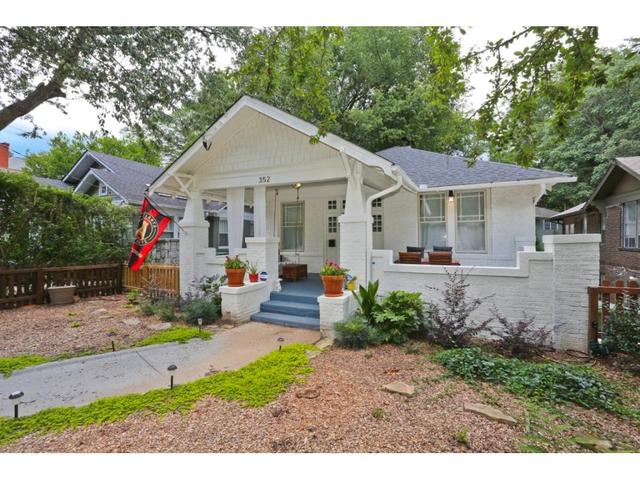 By: Commissioner Bob Ellis
By: Commissioner Bob Ellis
Early voting starts this week and while there are a number of key races with which you will be well familiar, there are several key referendum questions on your ballot that I want to call to your attention.
If you're a property owner in North Fulton or pay taxes to Fulton County Schools, you will have the opportunity to vote in November on laws that could mean lower property taxes. Several new homestead exemption measures passed during the 2018 legislative session will be on the ballot on November 6. I believe it is crucial for you understand them and their potential favorable impact on your property taxes.
Let's reflect briefly on why these measures are so important as Fulton County moves forward. If you remember  back in 2016, many homeowners got "sticker shock" when their tax bills arrived. Some properties' assessed value skyrocketed more than 100 percent, while most others jumped in double-digit percentages. That was due to the improved real estate market, the County Tax Assessor's Office playing catch up after not updating assessments for years and outright errors. The Fulton County Board of Commissioners voted to roll back the 2017 rate to the 2016 level to give homeowners some relief and prevent them from being taxed out of their homes. However, in 2018, many suffered sticker shock as new notices were provided as required by law, prompting more than 40,000 property owners to appeal their assessments. Aside from appealing, there is not much a property owner can do to lower their 2018 tax bill.
back in 2016, many homeowners got "sticker shock" when their tax bills arrived. Some properties' assessed value skyrocketed more than 100 percent, while most others jumped in double-digit percentages. That was due to the improved real estate market, the County Tax Assessor's Office playing catch up after not updating assessments for years and outright errors. The Fulton County Board of Commissioners voted to roll back the 2017 rate to the 2016 level to give homeowners some relief and prevent them from being taxed out of their homes. However, in 2018, many suffered sticker shock as new notices were provided as required by law, prompting more than 40,000 property owners to appeal their assessments. Aside from appealing, there is not much a property owner can do to lower their 2018 tax bill.
The good news? In 2019, property tax relief could be on the way if several referendums on the November ballot are approved by voters.
A "floating" homestead exemption caps the annually adjusted taxable assessed property value at a certain percentage, regardless of the actual increase in property values on a home. While individual assessments are uncapped, the homestead exemption grows to cap the taxable assessed property value. This will protect property owners from sharp increases in property taxes as a result of steep increases in assessed value. I have long been a proponent of some form of caps as they already exist in multiple states and in many counties in Georgia. Currently, Fulton County government and the City of Sandy Springs have floating homestead provisions in place.
All voters within the Fulton County school district will see ballot questions specific to Fulton County Schools and those in North Fulton will see specific questions for Alpharetta, Milton, Mountain Park, Johns Creek and Roswell.
ADDITIONAL $20,000 HOMESTEAD EXEMPTION FOR SENIORS
There will be an additional ballot question that asks all Fulton County voters to authorize an additional $20,000 homestead exemption applicable to the Fulton County government portion of your taxes for residents over the age of 65.
All Fulton County residents will vote on a floating homestead exemption that would cap the annually adjusted value at 3 percent over the determined lowest base year for Fulton County Schools (SB 317). Homeowners choose the lowest value year of 2016, 2017 or 2018 as their base year.
Ballot Question: Do you approve a new homestead exemption from Fulton County school district property taxes for educational purposes in the amount of the difference between the current year assessed value of a home and its lowest base year value, provided that the lowest base year value will be adjusted yearly by the lesser of 3 percent or the inflation rate?
Cities of Alpharetta, Johns Creek, Milton, Roswell & Mountain Park Residents in these municipalities will vote on a floating homestead exemption that would cap the annual adjusted value at 3 percent of the determined lowest base value year for their city.
Ballot question: Do you approve a new homestead exemption from the City of (Alpharetta, Johns Creek, Milton, Roswell, Mountain Park) property taxes for city purposes in the amount of the difference between the current year assesses value of a home and its lowest base year value, provided that the lowest base year value will be adjusted yearly by the lesser of 3 percent or the inflation rate?
Senior Homestead Exemption. All Fulton County residents will vote on an increased basic homestead exemption from $30,000 to $50,000 for residents 65+ years without income limits.
Ballot question: Shall the Act be approved which provides a homestead exemption from Fulton County ad valorem taxes for county purposes in the amount of $50,000 of the assessed value of the homestead for residents of that county who are older than 65 years of age?
If passed, these measures can result in meaningful tax relief next year and most importantly, long-term protections for those in homesteaded properties.
Early voting runs from October 15 through November 2. Election day is Tuesday, November 6, 2018.
I urge you to get out and vote to support these important ballots which would be a great win for homeowners. If you have any questions, please don't hesitate to give me a call. - Fulton County Commissioner, Bob Ellis.
Contact:
[email protected]
Office: 404.612.8216
Fulton Co. Gov. Center
141 Pryor Street, Suite 10024
Atlanta, Ga.
 [simpay id="15036"]
[simpay id="15036"]

Thanks you for this information. Please provide information of the other amendments of the ballot in your next publication.
https://www.johnscreekpost.com/breakdown-2-ballot-referendums/
https://www.johnscreekpost.com/breakdown-the-5-constitutional-amendments-on-the-november-2018-ballot/
As we vote on these amendments there are a few thoughts we should keep in mind. The amendment that increases the senior exemption shifts the tax burden from senior property owners to younger property owners. In many instances, seniors may have more income and lower expenses than younger individuals. Age is not a valid substitute parameter for income.
The amendments to limit increases in assessments will not limit property taxes themselves if the politicians increase the millage rate. Fulton county, which already has this assessment increase limitation in place, did not roll back property taxes. The City of Johns Creek offset the assessment increases with a rollback in the millage rate without the need for this amendment. What these amendments do is preserve the financial advantage of those property owners that are underassessed.
Vote for these amendments as you wish, but do not expect them to provide tax relief or make taxes more equitable.